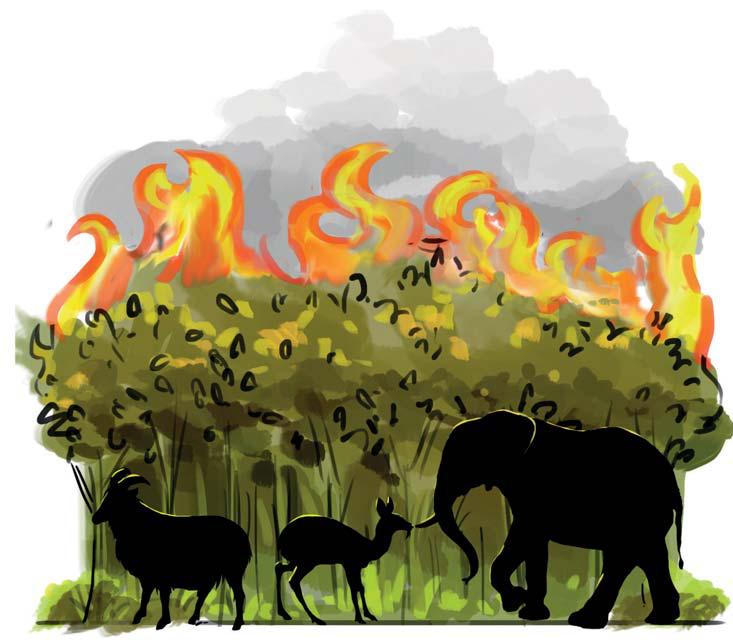
FOREST FIRES are becoming more frequent and fierce in Uttarakhand. Such regular burnings can be catastrophic for the state as well as the rich biodiversity it harbours. Uttarakhand is home to at least 102 species of mammals, 70 reptiles, 19 amphibians, and 124 species of fish. The state also boasts of 600 species of birds. The International Union for Conservation of Nature (IUCN) classifies 55 of the bird species as "threatened", of which six are critically endangered and four are endangered. Several mammalian fauna found in the state are also classified as endangered. The list includes the Asian elephant, tiger, Alpine musk deer, Himalayan musk deer, leopard, snow leopard, blue sheep, Himalayan Thar, leopard cat, Himalayan black bear, sloth bear and pangolin. With 7,000 species of plants, Uttarakhand contributes 31 per cent of the country's floral diversity. As many as 119 flowering plants are endemic to the state. The impact of recurrent forest fires in Uttarakhand is therefore not limited to the direct loss of trees and wildlife, their displacement and subsequent colonisation of unwanted species.
Forest fires can meddle with the life cycle of species and push many of the threatened and endemic species closer to extinction.
For instance, by destroying the leaves and foliage, a forest fire can significantly reduce the photosynthetic activity of surviving trees and thereby affect their growth. It can also damage the seed bank, both above and below the ground, and wipe out the seedlings and saplings growing on the forest floor. Species that are sparsely distributed and have small or patchy populations suffer the worst impacts as they lose their habitat, territories, shelter and food. The loss of keystone organisms in forest ecosystems, such as invertebrates, pollinators, and decomposers, can significantly slow the recovery rate of the forest.
Esta historia es de la edición April 16, 2023 de Down To Earth.
Comience su prueba gratuita de Magzter GOLD de 7 días para acceder a miles de historias premium seleccionadas y a más de 9,000 revistas y periódicos.
Ya eres suscriptor ? Conectar
Esta historia es de la edición April 16, 2023 de Down To Earth.
Comience su prueba gratuita de Magzter GOLD de 7 días para acceder a miles de historias premium seleccionadas y a más de 9,000 revistas y periódicos.
Ya eres suscriptor? Conectar

In leading role again
MOVIES AND WEB SERIES ARE ONCE AGAIN BEING SET IN RUSTIC BACKGROUNDS, INDICATING A RECONNECT BETWEEN CINEMA AND THE COUNTRYSIDE

One Nation One Subscription comes at a huge cost
As top US universities scrap big deals with top scientific publishers, India’s ONOS scheme seems flawed and outdated

Return of Rambhog
Bid to revive and sell the aromatic indigenous paddy variety has led to substantial profits for farmers in Uttar Pradesh's Terai region

Scarred by mining
Natural springs of Kashmir drying up due to illegal riverbed mining

Human-to-human spread a mutation away
CANADA IN mid-November confirmed its first human case of avian influenza, with a teenager in the British Columbia being hospitalised after contracting the H5N1 virus that causes the disease. The patient developed a severe form of the disease, also called bird flu, and had respiratory issues. There was no known cause of transmission.

True rehabilitation
Residents of Madhya Pradesh's Kakdi village take relocation as an opportunity to undertake afforestation, develop sustainable practices

INESCAPABLE THREAT
Chemical pollution is the most underrated and underreported risk of the 21st century that threatens all species and regions

THAT NIGHT, 40 YEARS AGO
Bhopal gas disaster is a tragedy that people continue to face

A JOKE, INDEED
A CONFERENCE OF IRRESPONSIBLE PARTIES THAT CREATED AN OPTICAL ILLUSION TO THE REALITY OF A NEW CLIMATE

THINGS FALL APART
THE WORLD HAS MADE PROGRESS IN MITIGATING EMISSIONS AND ADAPTING TO CLIMATE IMPACTS. BUT THE PROGRESS REMAINS GROSSLY INADEQUATE